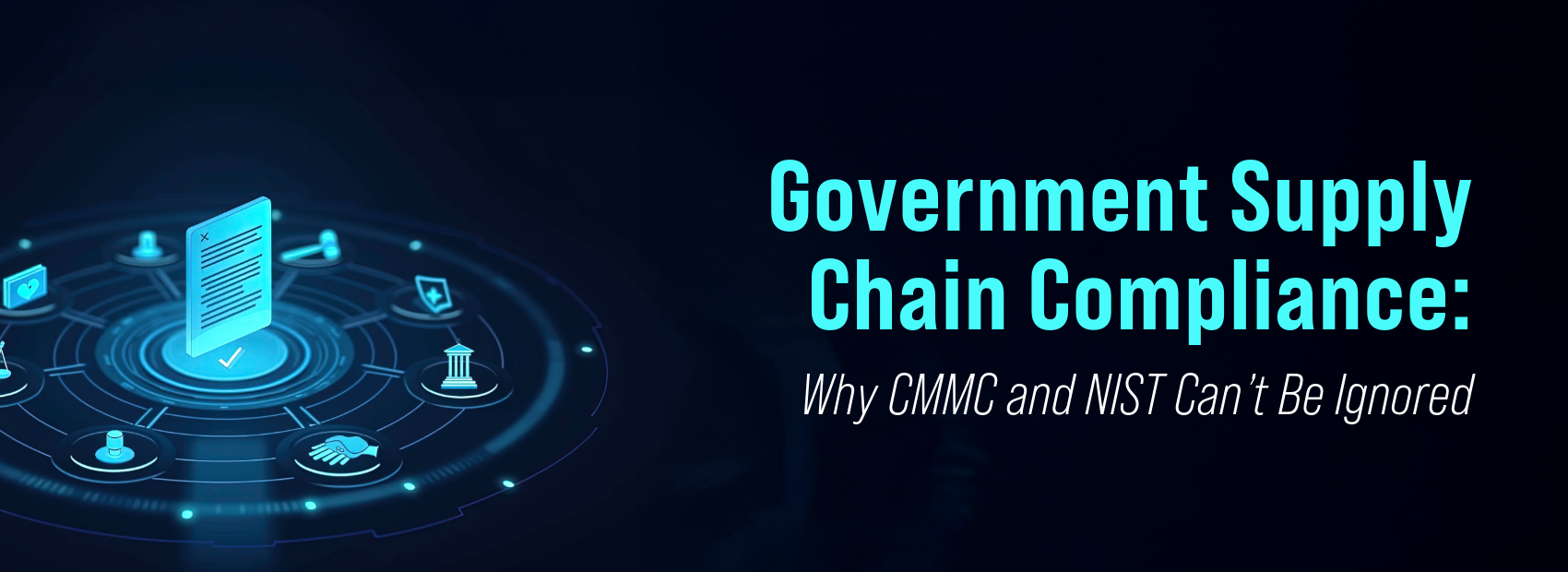Pileus Technologies: Blog

Government Supply Chain Compliance: Why CMMC and NIST Can’t Be Ignored
The urgency of government supply chain compliance has never been greater, and the pressure continues to rise. Organizations providing products or services to the federal government now face heightened scrutiny around cybersecurity, regulatory requirements, and overall supply chain security as the Cybersecurity Maturity Model Certification (CMMC) and NIST 800-171 standards move to the forefront of contract eligibility, compliance shifts from being a baseline requirement to becoming a competitive differentiator.
For every company in the supply chain, whether a prime contractor or a small subcontractor, compliance goes far beyond checking boxes. Instead, it plays a vital role in securing sensitive data, protecting national interests, and safeguarding long-term business viability. To illustrate why compliance must be prioritized now, let’s explore five critical reasons.
CMMC Is Becoming Mandatory
CMMC was specifically designed to protect Federal Contract Information (FCI) and Controlled Unclassified Information (CUI) within the Department of Defense supply chain. As this program rolls out, contracts will begin requiring certification. Without it, organizations will simply lose the ability to bid.
Due to this shift, companies that delay preparing for government supply chain compliance put themselves at immediate risk. Regardless of past performance, those who fail to certify will be excluded from participation. On the other hand, businesses that take action early will be positioned to win contracts while competitors scramble to meet requirements.
NIST 800-171 Enforcement Is Increasing
For years, many organizations relied on self-attestation to claim compliance with NIST 800-171. However, that approach is rapidly coming to an end. Agencies are tightening oversight, and third-party verification is becoming the standard.
As a result, documented policies, measurable security controls, and validated practices are no longer optional—they are essential. Effective government supply chain compliance requires more than good intentions; it demands proof. Companies unable to demonstrate their adherence to standards face contract losses, compliance failures, and reputational harm.
Third-Party Risk Is Under Scrutiny
Threat actors consistently look for the weakest link in a supply chain. Even the smallest subcontractors, handling seemingly minor tasks, can introduce significant vulnerabilities if they are not compliant.
Recognizing this risk, the government has taken a more comprehensive approach to supply chain security. This means every participant, from prime contractors to the smallest subcontractor, is accountable. Consequently, companies that ignore government supply chain compliance requirements not only endanger themselves but also put their partners at risk. The ripple effect of noncompliance can jeopardize entire projects.
Penalties for Noncompliance Are Growing
The consequences of non-compliance are becoming increasingly severe. The Department of Justice has already indicated increased reliance on the False Claims Act to pursue contractors that misrepresent cybersecurity compliance. This enforcement can lead to substantial fines, lost contracts, and damaging public exposure.
In contrast, companies that proactively address government supply chain compliance show clear due diligence and significantly reduce their liability. The investment in compliance is far smaller than the financial, legal, and reputational costs of neglecting it.
Compliance Is a Business Enabler
Although many organizations view compliance as a burden, it can actually become a powerful business enabler. Companies with strong compliance programs demonstrate that they can be trusted partners who protect sensitive data and meet stringent federal requirements.
As a result, prime contractors are increasingly preferring subcontractors that demonstrate compliance with government supply chain regulations. What once seemed like an administrative hurdle has now become a gateway to new opportunities. Compliance, therefore, does more than just check a box—it strengthens a company’s competitive positioning.
The Bottom Line
Today, government contracts are no longer awarded solely on the basis of technical ability or price. Security, accountability, and compliance now serve as critical components of eligibility. For any organization in the federal ecosystem, government supply chain compliance has become the foundation for building trust, avoiding penalties, and securing growth.
Organizations that prioritize CMMC and NIST standards today will protect their future role in government projects tomorrow. Delaying is no longer a safe option.
Is your organization prepared for the next wave of compliance audits? Don’t risk losing valuable contracts or damaging your credibility. Take the first step now, schedule a compliance readiness assessment and ensure your business aligns with both CMMC and NIST requirements.
Learn more about the CMMC model and requirements from the U.S. Department of Defense
Explore NIST 800-171 guidelines and resources directly from NIST





